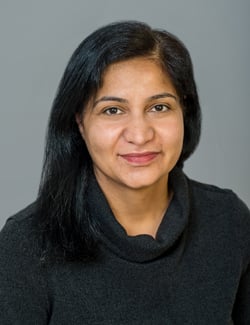Q&A: Geriatrician
Did you know that 1 in 5 Americans are over 65 and that seniors over 85 are the fastest-growing segment of the population?
This large group of individuals requires care for both chronic medical conditions and oversight of annual screenings and preventive care. A geriatrician is a helpful resource in partnering with patients. Research shows 30% of people over the age of 65 need care from a geriatrician.
Welcome Dr. Mamta Singh!
Due to the evolving demand for Geriatric care, we are very pleased to have Dr. Mamta Singh a part of the ECHN Medical Staff! Dr. Gingh is a board-certified physician in internal medicine specializing in geriatric care. We connected with Dr. Mamta Singh to learn more about her services and geriatric care.

Q: What is your position at ECHN?
A: I am a Primary Care Physician and Geriatrician.
Q: Where are you located?
A: I see patients at 629 Middle Turnpike East in Manchester.
Q: What is your educational background?
A: I attended Jawaharlal Nehru Medical College in India. After that, I completed my internship at the Icahn School of Medicine at Mount Sinai, at the Bronx Program in New York. I completed the Internal Medicine Residency in 2016 and my Geriatric Fellowship in 2018, both at the University of Connecticut.
Q: Can you explain what a Geriatrician does?
A: A geriatrician provides the medical evaluation and treatment of problems that commonly occur later in life, such as diabetes, hypertension, arthritis, osteoporosis, urinary incontinence, multiple medication management and many more. At the same time, a geriatrician will focus on a patient’s cognitive state and provide treatment for those who have memory problems, confusion, dementia, anxiety and thought disorders.
Geriatricians are adept at handling multiple problems at the same time and can provide social evaluation and counseling for caregiver stress, adjustment issues for seniors and family members, help resolve problems of daily living, and manage those with a dementing illness.
A geriatrician takes care of seniors who experience multiple healthcare challenges and provides support to the patient’s family to ensure that their patients are healthy.
Q: Who should visit a Geriatrician?
A: Elderly individuals are the ones who should visit a geriatrician, especially if they suffer from chronic, complex medical conditions or if they feel they could benefit from a geriatric consultation to discuss functioning and quality of life.
Q: When should someone visit a Geriatrician?
A: Someone should visit a geriatrician if they are over the age of 65 and are having trouble with daily functioning if they are experiencing chronic problems, if they take multiple medications, or if they have any memory loss.
Q: Why would someone need to come see you?
A: Someone would visit a geriatrician if they have been experiencing cognitive decline, age-related frailty, osteoporosis if they need a fall assessment and if they have multiple morbidity and functional losses.
Q: How are you different than a Primary Care Provider?
A: Geriatricians take a holistic approach to care by monitoring a patient’s chronic conditions, watching for changes in function and then treat those conditions, keeping in mind that the goal is to improve function. Specifically, geriatricians concentrate on the areas that tend to affect older adults in greater numbers, including but not limited to:
- Arthritis
- Alzheimer’s
- Balance Issues
- Cancer
- Dementia
- Diabetes
- Depression
- Frailty
- Heart Disease
- Incontinence
- Insomnia
- Osteoporosis
Q: What are your interests regarding your specialty?
A: My interests are in:
- The management of chronic diseases like hypertension and diabetes
- Cognitive Assessment
- Urinary Incontinence
- Osteoporosis
- Behavioral Issues in Dementia
- Geriatric consultation and preventative health
- Arthritis
- Polypharmacy (taking multiple medications)
Q: What are you looking forward to/goals at ECHN?
A: My goal at ECHN is to take good care of my patients and help ECHN achieve its mission in developing positive relationships with patients by providing high-quality, compassionate care.




